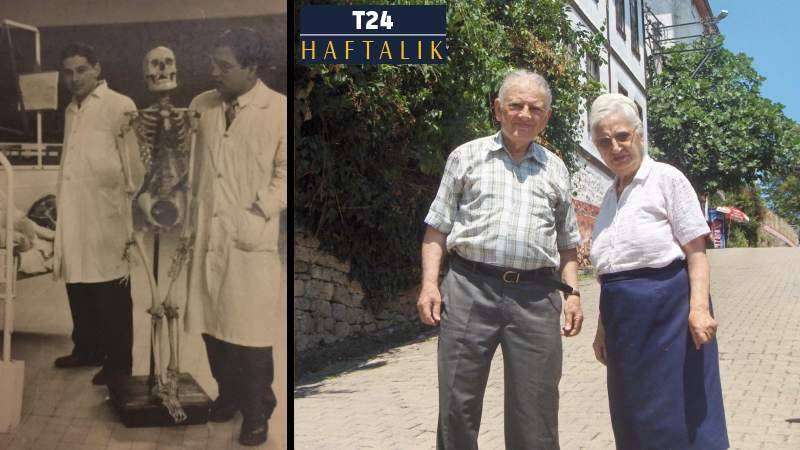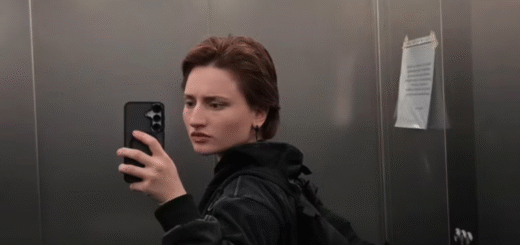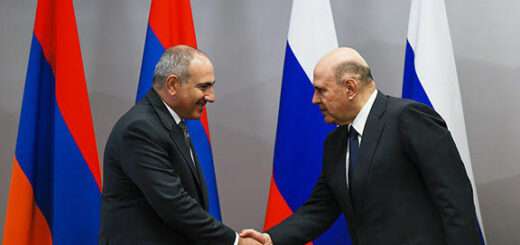Turkey Refuses to Name Street After Armenian Doctor

Güven Bayar
T24.com
For years, not only in Ordu, but also in the regions and villages, the patients treated free of charge by Armenian doctor Tigran Toraman, the medicines prepared by pharmacist Artem Toraman at a time when there were no ready-made medicines, and which cured everyone, their love for this country, their hard work and existence above all identities are not enough to name the street where their 150-year-old ancestral home is located.
October 27-28, 2022 marks the third anniversary of the deaths of doctor Tigran Toraman and his brother, pharmacist Artem Toraman, who died just one day apart. The honorable lives of doctor Tigran Toraman (born 1932) and pharmacist Artem Toraman (born 1936) in Ordu left an unforgettable mark on the memory of the city.
Despite all the difficulties, the Toraman brothers, who never refused to live in the country where they were born and raised, established strong ties with all strata of society and left an unforgettable mark on the city’s memory. Not only was the street where their house was located renamed after them as a testament to their loyalty during their lifetime, but over the course of three years, we have witnessed how social memory, through local institutions that promote the politics of denial and official historiography, acquires an identity structure and reaches the point of social disintegration.
The shame, human rights violations and century-old laments that spread throughout the city after the thousands of signatures collected within the framework of the petition launched after their funeral and dozens of articles and statements of support published in the press, deeply hurt us all.
Tigran and Artem Toraman’s grandmother, Elmon Hanym, during the 1915 deportation (Armenian Genocide), she went to Svas, while their grandfather, Adam Toraman, embarked on a death journey to Malatya. Elmon Hanum found refuge in the American Carpet Factory in Svas, where she stayed from 1915 to 1919, managing to survive. No one knows where or how her husband, Atam Toraman, and his siblings and their families died. My maternal grandparents also died during the deportation. In interviews with Uncle Tigran, he said: “My parents had seven siblings, and two of them survived the deportation, and I met them.” My maternal uncle, who died during the deportation, was the first pharmacist in Ordu. His other uncle, Poghos Olmezyan, lived and died in Istanbul as a coppersmith. They had no children. They lived in Uncle Tigran’s house in the Kurtuluş district of Şişli for years. More or less, things are unfounded.

After the funeral, we first turned to Ordu Mayor Hilmi Güler and Altınordu Mayor Ashkan Tören with a request to change the street name, but they immediately reminded us that there would be a fee for this, demanding Tigran Toraman’s father’s house. The mayor even demanded the land in front of the house to turn it into a playground.

Foundations, associations and unknown institutions and organizations that enjoyed the support of the governorate and the municipality, as if they had no heirs, wives or daughters, demanded that the building be given to them for 40 years in exchange for renovation.
The hunters, chanting “My dear brother Tigran,” were also searching for Uncle Artem’s pharmacy (Itimat Pharmacy) on Seripaşa Street (Fidangyor) and the building housing Uncle Tigran’s office.
If half the attention and interest shown to his property had been directed at the street where his house is located, that 100-meter-long street would now be named after him. Moreover, the Ordu Medical Association and the Ordu Pharmacists Association are still faking their deaths.
There is no press in Ordu. There are cunning, provincial newspaper owners in small towns, whose chain of connections is unknown, who publish wedding invitations in the same newspaper. They targeted the house even before the establishment of the archaeological and city museums in the city, and started spreading stories like “Let’s build a museum.” No one knows what kind of museum it is. All this was not enough, rumors are circulating that the “Toraman brothers” were fed, educated, and trained by the people of Ordu. I think these are the ones who looted the Toraman family’s wealth during the 1942 Property Tax and sent their children to school. Uncle Tigran described the irrational, illegal, and immoral experience the Toraman family had in Ordu during the 1942 Property Tax: Doctor Sefer Altan’s brother, Ismail Altan, was responsible for the collections. He was also the cashier of the Ordu Municipality. Ismail Altan was a close friend of my father. He would come to the shop every day after lunch and drink coffee with us. When the Property Tax was introduced during the war in 1942, the shop was empty of goods, property, and employees. One day, while I was drinking coffee, he came and started looking at the things behind the shelves. My father said, “Sir, what are you looking for?” He said, “I’m looking for a bathtub.” Then he got up and left. Fifteen days later, my father was fined 15,000 liras in wealth tax. Hacı Garegin Efendi, who was a clothes seller and was in the shop, received news that he had been assessed a wealth tax of 50,000 liras. Within 15 days, my father was assessed a tax of 15,000 liras. Since he could not pay, my father was fined 500 liras and Garegin Efendi was fined 5,000 liras. There were three shops on the corner opposite Nezirlar, in the Ordu grain market. My father sold them to a man named Sarı Hafiz for a price that was not worth it.
The mayor of Ordu, Ibrahim Turkmen, Kazim Turkmen’s uncle, was there, and he helped. Osman Agha helped, and my father avoided going to Ashkale. After giving the money, Ismail Altan came in and said to my father: “You’ve made us a fool of ourselves. We can’t send you to Ashkale anymore.” He said that to my father’s face…. He didn’t forget those words until his death.

Months passed, and Aşken Türen lost the local elections. After years of hoping for change, Ulaş Tepe, a young candidate for the mayor of Altınordu, was appointed in his place. This time, I wanted to restart the process with him and submitted a petition to change the street’s name. They received a response that the municipality has the authority to name streets. We know that too. They decided to bypass the situation. Meanwhile, if the name change of the street requested for the house within the Altınordu Municipality had been voted on by the Altınordu Municipality and submitted to the Ordu Municipality, as it should have been, public opinion would have been formed and this shame would have been avoided. But the Altınordu Municipality said the following: “What good does it do us?” Our mayors are pathologically nationalistic. The saying “Let everyone know who they are” became a reality, and a nationalistic child appeared within the CH Party. After some time, it was revealed that he had shamelessly demanded the house from the family. The family expressed their regret for the situation.

We have witnessed and continue to witness a change in political parties in Ordu, not a change in mentality. The 100-year-old obscuring of Ordu’s multicultural history and past continues with a supra-party, identity-based mindset.
Garnik Kalajian, who founded the first printing house in Ordu in 1913 and published the newspaper “Osmanyan Agency”, has no place in the history of the press. Dozens of Armenian and Greek sources remain unrestored. The structures of the Armenian (Zaferimilli) and Greek (Tashbaşı) districts that make up the urban identity of Ordu are not preserved with their histories. The names of Armenian and Greek churches and schools are changed, and traces of these structures are destroyed. The mansion of Kostas Efendi becomes the Sari Konak, the mansion of Zahare (Tokatlıadis) becomes the Children’s Library, and the mansion of the Hekimyans becomes the mansion of Saatchi Hafiz Efendi. Iaşon Burnu, Kurul Kale and many other historical sites, along with our multicultural heritage, are deprived of their identity.
Years have passed, and the street where Dr. Tigran Toraman and pharmacist Artem Toraman lived has not yet been named after them, despite the third anniversary of their deaths. “It can be named after Dr. Mehmet Hilmi Memecan, Dr. Ismail Engin, Dr. Muruvet Sitki, Dr. Gündüz Çelebioğlu, Dr. Fahrettin Onsel, Dr. Sadık Ahmed, and pharmacist Kani Arslan.
It can be named after the street where Setk Çebi’s house was located during his lifetime, as well as those of Temel Uzlu, Bahriye Uçok, Kahraman Sağra, Setk Can, journalist Bilal Köyden, Kazım Vardar and Alaattin Benal. One can name Hacı Mustafa Katırçıoğlu, Bekir Setki Pamuk, Şakir Çoruhi, Edibe Akyol, Idris Gürsoy, Veysel Akgun, Muhsin Tercan and Arif Hikmet Onat. They can be named after Şükrü Efendi, they can be named after Serdar Zade Mustafa Efendi, they can be named after Reisi. Hakkı Gürsoy, they can be named after Tevfik Çağlari, there is no nameless person left in the Furtun family…
I do not want to make comparisons with many of the names mentioned above, but Dr. Tigran Toraman and his brother, who have contributed more to this city than others, were not named because of their Armenian identity. The patients treated free of charge by Dr. Tigran Toraman for years, not only in Ordu but also in the regions and villages, his 20 years as a field doctor in Orduspor, the medicines prepared by pharmacist Artem Toraman at a time when ready-made medicines were not available and who treated everyone, their love for this country, their with prayer hard work and existence above all identities are not enough to name the street where their 150-year-old ancestral house is located. Instead of considering remembering and commemorating as a “useless effort”, we should accept it as a moral and conscientious responsibility.
We too were born, grew up, grew old and went through all this. who, but the truth — the conscious responsibility to remember and proclaim the truth lies in putting aside all identities and becoming human. Because “There is no salvation alone.” Because “Justice for all.” Because “Everything will be fine.” Then let us first clean up around our own house. The governors, members of parliament and mayors of this city may be forgotten, but brothers Tigran and Artem will be remembered with prayer and love generation and generation.։





